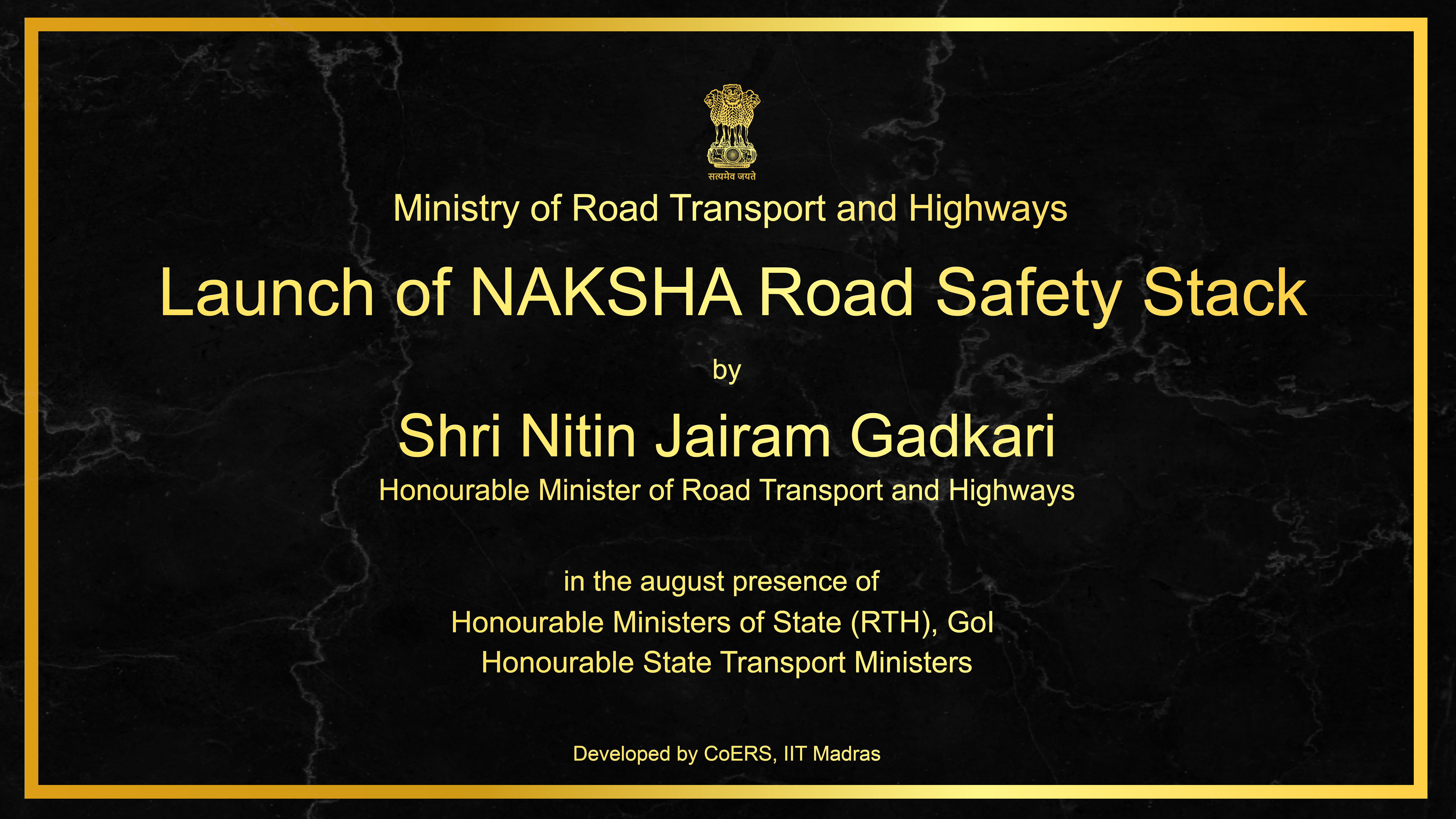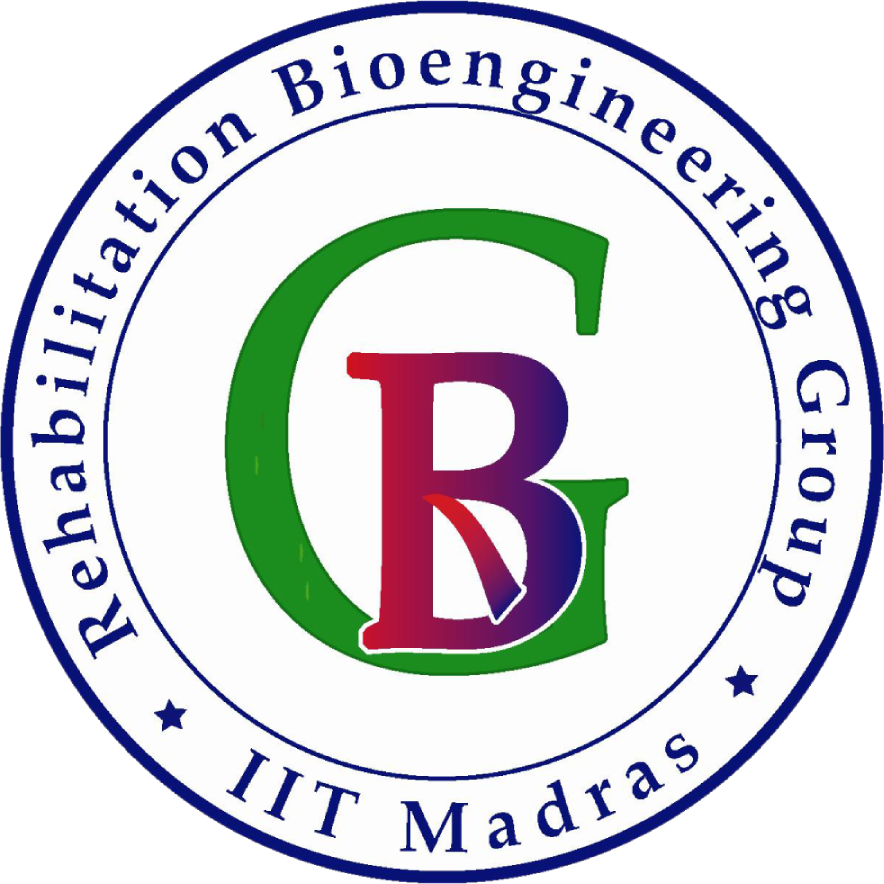
- This event has passed.
Launch of Naksha – Road Safety Stack
January 7, 2025 @ 8:00 am - 5:00 pm

Honourable Union Minister for Road Transport and Highways Nitin Gadkari launched, Naksha, a Road Safety Stack developed by the Indian Institute of Technology Madras’ (IIT Madras) Centre of Excellence for Road Safety (CoERS). Naksha will empower stakeholders including road-owning agencies, law enforcement, emergency care providers and other stakeholders to collect focused data at the grassroot level and formulate evidence-based targeted interventions.
Launching the platform, Shri Nitin Jairam Gadkari, Honourable Minister for Road Transport and Highways, Government of India, said, “Globally we rank among the top five countries by road accidents and fatalities, causing an economic loss of 3% of GDP and significant socio-economic strain on families. The age group of 18 to 34 contributes to nearly 66% of fatalities which imposes serious socio-economic strain on families. With the launch of Naksha, a comprehensive Road Safety Stack helps the State and District level officials understand the details of the accident it’s contributing factors and also address blackspots more effectively. Road safety is a priority, and we are committed to implementing time-bound targeted solutions.”
The tools in Naksha include Sanjaya, Madras Matrix and Field Perception Survey (FPS).
Sanjaya is an interactive visualization dashboard of road accidents that is to be used at a senior administrative level. At the district level, crash black spots, emerging black spots, kilometre analysis, corridor analysis, cluster analysis, point radius analysis and forecast. Heatmap for visualization and trend patterns can be performed. Sanjaya facilitates optimal utilization of human and financial resources for greater impact with real time data.
Field Perception Survey (FPS) is used to capture the perceived accident hotspots by the jurisdictional stakeholders to identify potential accident hotspots based on their field experience and local intelligence. FPS provides a bottom-up approach, capturing crash contributing factors and potential hazards leading to accidents. It bridges data gaps by providing qualitative insights that complement quantitative records, addressing issues like underreporting and recognizing minor incidents or near misses. This data can be used by the local administration to strategize low-cost engineering and administrative interventions.
Madras Matrix (MM) allows for a scientific approach to evaluate optimal speed limits on roadways. It can be adopted as a framework for implementing Motor Vehicles (MV) Act, Section 112 by local administration. Madras Matrix adopts a two-fold approach, i.e., Perception which impacts the driver behaviour more primarily and data with is required for statistical inference. This guideline can be used by the local administration to arrive at an appropriate speed limit.
Speaking on the occasion, Professor V Kamakoti, Director, IIT Madras, said, “At IIT Madras, we strongly feel that solving societal issues is of utmost importance and we have been working on technology-based solutions to address these. We are committed to the vision of reducing road accidents and fatalities and we look forward to working with all the stakeholders to achieve this.”
Addressing the gathering, Shri V Umashankar, Secretary, Ministry for Road Transport and Highways, Government of India, said,” Road accidents are a serious matter that needs to be dealt with in a proper, scientific manner. The Naksha Road Safety Stack will provide us with a detailed analysis of accidents, compute black-spots and patterns backed by data collection at the grassroots level, accompanied with detailed infographic visualisation of the data that will help us arrive at an all-encompassing understanding in order to provide both short and long-term interventions.”
India currently has the highest number of road crashes and fatalities in the world. Crash data from 2022 published by the Union Ministry of Road Transport and Highways (MoRTH) attributes that nearly 60% of fatalities took place on 5% of the roads (National and State Highways) in India.
The working age group of 18 to 60 accounts for 83.4% of total road crash fatalities in the country, which has serious implications on the emotional and psychological impact on family and society at large and imposes significant socioeconomic costs on the Nation.
Naksha comprises of tools that provide a scientific framework for solving problems at the jurisdiction level. By building on the Integrated Road Accident Database (iRAD) inaugurated by Shri Gadkari in January 2020, CoERS has designed Naksha to supplement existing systems and enable grassroots-level data collection and analysis.
The key features of Naksha include:
- Map-based analyses of blackspots and emerging blackspots across the Country, sorted by jurisdiction of States, and Districts.
- Infographic and visual displays of data to enable better understanding of crash patterns in a region of interest.
- Provides a bottom-up approach, capturing crash contributing factors and potential hazards at the perceived accident hotspots by the jurisdictional stakeholders based on their field experience and local intelligence.
- Provision of a scientific approach to evaluate optimal speed limits based on perception which impacts the driver behaviour more primarily and data which is required for statistical inference.
- Can be used by the local administration to strategize low-cost engineering and administrative interventions.
Elaborating on the platform, Professor Venkatesh Balasubramanian, Head, CoERS and RBG Labs, Department of Engineering Design, IIT Madras, who is coordinating this initiative, said, “A sharp reduction of road fatalities is the basic requirement for us to progress as a Nation. As a shared asset, safety on roads is a collective responsibility that involves all stakeholders. Data is crucial when it comes to targeted interventions as it provides an understanding of where capacity constraints and requirements are present. With Naksha, and with the help of data-driven interventions on road safety, we are paving our way towards our target of making our roads safe for all.”
- Union Minister for Road Transport and Highways Shri Nitin Gadkari addressing the gathering
- Prof Venkatesh Balasubramanian addressing the gathering


